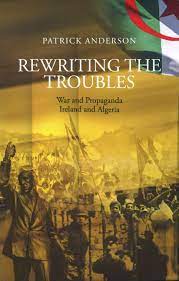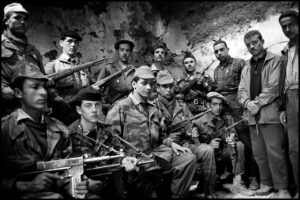Book Review: Rewriting the Troubles, War and Propaganda in Ireland and Algeria
 By Patrick Anderson
By Patrick Anderson
Reviewer: Donal Hassett
Published by Greenisland Press, 2022.
ISBN-13: 978-3949573026
Patrick Anderson’s Rewriting the Troubles is engaging and frustrating in equal measure, showing both the possibilities and the limits of the use of cross-colonial comparison to understand contemporary Irish histories. Blending the polemical with the academic, Anderson has produced a book that is sure to provoke debate and stimulate a wide and varied audience.
His use of the contrast between the discussion of violence and struggle in Algeria and in the North of Ireland in the pages of the Guardian and the Observer to expose the indifference, complacency, and complicity of the British liberal media during the Troubles is both thought-provoking and timely. However, this is undercut by an overly simplistic and sometimes misleading comparative framework that, in an effort to counter the self-exculpatory discourses of the British Establishment, ends up minimising French violence and misrepresenting colonialism and the struggle against it in Algeria.
Patrick Anderson contrasts the discussion of conflict in Algeria and the North of Ireland in the pages of the Guardian and the Observer to expose the indifference, complacency, and complicity of the British liberal media during the Troubles.
Turning first to the book’s strengths, Anderson effectively exploits the corpus of interviews he conducted with liberal journalists to highlight the extent to which their enthusiasm for talking about the conflict in Algeria and their clear support for the nationalist struggle stood in sharp contrast to their reticence to discuss the North of Ireland and their broad support for the British state’s actions there.
Drawing on Chomsky and Herman’s ‘Propaganda Model’, Anderson argues that the British media, including its liberal wing, both reflected and helped to constitute the hegemonic narrative of the Troubles promoted by the British state, suggesting that the comparison with their coverage Algeria is the best way to illustrate this.
Whatever the limits of the comparative framework he articulates, the juxtaposition of the journalists’ critiques of French violence and uncritical support of the FLN’s tactics alongside their broad support for the repressive actions of the British state in the North of Ireland and their hostility towards republicans is powerful. The almost blanket refusal of most of these journalists to consider the comparison between the two contexts and the different media discourses they generated, underlines the existence of a kind of British exceptionalism that could not countenance state collusion, repression and structural violence.
Exposing the hypocrisy of the British press is both thought-provoking and timely. But, at times simplistic parallels between Ireland and Algeria end up minimising French violence and misrepresenting colonialism and the struggle against it in Algeria.
Anderson exposes and critiques the constructed dichotomies between French ruthlessness and British restraint, the political interference of the French military and the supposed neutrality of its British counterpart, the sanctity of the national territory of Algeria and the legitimacy of partition in Ireland, and the heroic anti-colonial struggle in North Africa and the vicious sectarian civil war in the North of Ireland. In the process, he shines an often harsh light on the lack of critical reflection among British liberal media actors in their analysis of the conflict in the North, where they, at least in Anderson’s judgement, were all too ready to adopt and reproduce official state narratives.
Where the book falls short, at least in the view of this specialist of Algerian history, is the extent to which the focus on countering the narratives of the British liberal journalists, overwhelmingly sympathetic to the FLN, leads it to downplay the inherent violence of the colonial system in Algeria.
While this reviewer would not share the phrasing of Anderson’s confident assertion that ‘the Algerian analogy is strikingly close and bears no serious refutation’ (63), I have long argued for the value of cross-colonial comparisons in Irish (and indeed in Algerian) history. This, however, necessitates a thorough engagement with relevant literature in both fields. Anderson’s engagement with Algerian historiography is limited and he relies heavily on older texts produced during or in the decades that followed the War of Independence and the Algerian Revolution.
He quite rightly critiques the work of figures like Alastair Horne or Jean Lartéguy but then repeatedly cites them to support his analysis. The transformative scholarship that has been produced in the last decade in France, Algeria and even in the Anglophone world is not mentioned at all. This has a concrete impact on how he develops his comparative framework.
Many scholars of Algerian history would, I suspect, balk at the credence Anderson gives throughout the book to different visions of reform proposed by the French during the conflict, given France’s very recent pre-conflict history of stuffing ballot boxes, repressing political opposition, and even massacring civilians.
The French military’s ‘humanitarian actions’ in Algeria included the forced confinement of over 2 million Algerians in ‘regroupment camps’.
Likewise, Anderson’s narrative that the ‘hearts and minds’ campaign of the French Army was undercut by the actions of its commandos (129) downplays the extent to which the military’s supposed humanitarian action was underpinned by violence, not least the forced confinement of over 2 million Algerians in ‘regroupment camps’. His analysis of the practice of torture by the French Army, which does not engage with Raphaëlle Branche’s major publication on the topic (2016), problematically minimises its institutionalisation in Algeria as a means to emphasise its normalisation within the British Army (151).
His broader discussion of the attitudes of both the leadership and the rank-and-file of the British and French Armies does not really grapple with the fundamental difference between leading and serving in a professional army and a partially conscripted army. One would have to wonder if the mass deployment of conscripts from Britain would have led to the emergence of the kind of concerted anti-war movement that arose in France, even if the radical political culture that drove at least part of the critiques in France (and especially in its media) was weaker in Britain.
The book lacks a sense of the scale of the pervasive repression that underpinned colonial rule in Algeria. At one point Anderson argues that the law required less ‘restraint in Northern Ireland, where the Special Powers Act had been continuously available since 1922’ (109) than in colonial Algeria, ignoring the fact that Algerians were subject to the brutal and arbitrary colonial legal code, the Indigénat, until 1946 and that, as Sylvie Thénault’s research has shown, the police and army operated with a high degree of impunity in the colony long before the introduction of a formal state of exception.
While Anderson argues for a deeper engagement with the enduring weight of anti-Irish prejudice in both British military policy and British media discourse, he seems to diminish the discriminatory nature of a French colonial order that, for example, excluded the vast majority of Algerians from access to the type of education that was so central to Catholic experiences in the North of Ireland. Although the author clearly has an interest in and knowledge of the Algerian War, too often the Algerian case appears primarily as a foil to expose the hypocrisies of the British liberal media, not as a complex history worthy of consideration on its own terms.
This is a pity because the additional nuance that a deeper engagement with Algerian history would bring would likely refine Anderson’s central argument without fundamentally destabilising it. It is not necessary to downplay French brutality in order to highlight the media silence around collusion and torture in Northern Ireland. Nor is it essential to reproduce Orientalist tropes in discussions of the ‘cold savagery’ of the FLN and the supposedly depoliticised nature of religiously framed struggle against colonialism in Algeria to question a purely sectarian reading of the conflict in the North of Ireland.
It is not necessary to downplay French brutality in order to highlight the media silence around collusion and torture in Northern Ireland.

Acknowledging the heightened scale and intensity of state discrimination and violence experienced by Algerians does not diminish the reality of discrimination in Northern Ireland nor undermine the validity of a comparative analysis. It should, however, inform the historical and political judgements readers of this text will make on the deployment of violence by both state and non-state actors in both of these conflicts.
While there may be some degree of merit to his argument that the Provisional IRA did not, in theory if not in practice, consistently target civilians in the same manner as the FLN did, the lack of an extended discussion about the different horizons of possibilities for Algerians and Irish Catholics within the political systems of both contexts makes the comparison overly simplistic.
Furthermore, the clear contrast Anderson seeks draw between the FLN and the IRA is supported by a sometimes selective and decontextualised engagement with their use of violence. The image of an FLN largely indifferent to civilian casualties and a Provisional IRA committed to averting to them is undercut by examples he himself cites within the text. The FLN’s assassination in 1956 of the settler politician Amedée Froger avoided civilian casualties while the three civilians, including two children, killed in the IRA’s assassination of Louis Mountbatten go unmentioned in the book.
Anderson convincingly points out the contrast between the British liberal press’ credulity, often veering into uncritical support, when it came to the FLN’s actions and intentions and their hostility and suspicion of those of the IRA. This reader felt that Anderson sometimes came perilously close to simply reversing that dynamic in his own analysis.
Rewriting the Troubles is a thought-provoking read that represents a valuable contribution to contemporary historiographical and political discussions in Ireland.
Indeed, this speaks to a broader lack of nuance that undermines the credibility of the overall analysis. The different intensity, scales, histories, and evolutions of colonialism and forms of resistance in Ireland and in Algeria have much to teach us about the history of both countries. Anderson quite rightly critiques the refusal of the journalists he discusses to reflect critically on the comparison between the two contexts. I was left wishing that the author himself had been more critical in developing his own comparative framework.
These critiques notwithstanding, Rewriting the Troubles is a thought-provoking read that represents a valuable contribution to contemporary historiographical and political discussions in Ireland. Anderson has (re-)opened a useful avenue of comparative enquiry, as well as perhaps a debate on how best to realise this, that other scholars would do well to engage with.
He has also drawn attention to the way hegemonic narratives about the Troubles were constructed, maintained, and perpetuated in the pages of the liberal British press. This too will, I suspect, generate rich and productive debates that will expand our knowledge and enhance our understanding of the conflict in the North. While different readers will take different things from this book, it is sure to leave no one indifferent.
Dr Dónal Hassett is a Lecturer in French at University College Cork who teaches on topics relating to the history, the politics and the societies of France and the wider Francophone world.